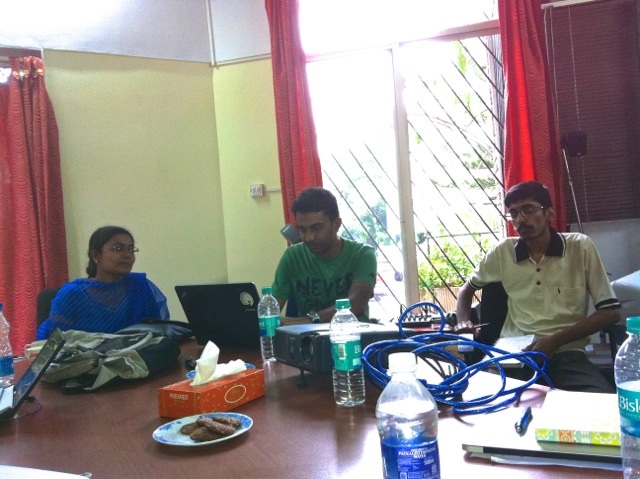Bengaluru: A Hub for Kannada and Sanskrit Wikipedia and other Wikimedia projects!
Kannada Wikipedia is one of those Indic language wikipedias which has seen many readers coming up every month. Subhashish Panigrahi summarizes the experiences of some of the very active Kannada wikipedians from the recent Kannada Wikipedia meetup held in Bengaluru on October 7, 2012.
Seven Kannada wikipedians (a couple of them also contribute to Sanskrit Wikipedia) participated in this event. Nitika Tandon and Subhashish Panigrahi from the Access to Knowledge team of the Centre for Internet & Society and Jessie Wild from the Wikimedia Foundation also participated in the event.
After a brief introduction about the theme of the meetup, Omshivaprakash, one of the active contributors for community building who also solves technical issues besides contributing articles explained the history and happenings of Kannada Wikipedia said “the only reason all of us joined together to contribute for Kannada Wikipedia is because we love our mother language, Kannada.” He explained how he reached out to a renowned Kannada writer asking him to document his own writings and books to become active on Kannada Wikipedia and start contributing. In the recent past Kannada community has organized many outreach events. The presentation for each outreach has been translated and customized for effective presentation. In the past they struggled for the six username creation barrier. Om also spoke about the scope of government partnership for including Kannada Wikipedia in the school syllabus (which worked out really well in Kerala) for which he is willing to meet the government officials. Additionally, he also shared the idea of recording an outreach session and presenting it to the government.
Another active wikipedian, Tejas emphasized the importance of having Kannada Wikipedia as part of the syllabus where lecturers and teachers will be learning to teach about Wikipedia in the classroom. As this will be mandatory, both students and teachers will take it seriously and it would be a sustainable practice. To show the results about 4-5 schools could be shortlisted for a pilot program. Tejas also proposed the idea of including Kannada typing in schools because that is something most people are not taught.

The above picture shows some participants working on their laptops during the meetup.
The wikipedians further discussed about Kannada Wiktionary and how collaborations will work to bridge the gap of wikipedians who contribute separately for Kannada Wikipedia and Wiktionary. Frequently Used Entries for Localization (FUEL) is a great project for creating content on Wiktionary, which will involve bringing new people to the community. In Bengaluru, CIS and Sanchaya co-hosted a two-day workshop for discussion regarding the same. Involving more wikimedians for such workshops would be helpful for both the projects, Wikipedia and Wiktionary. “I was always keen to do something for Kannada language on the web, being a software professional nothing leaves me a better chance to work for such a project like Wikipedia in my own language,” expresses Pavithra, another active Kannada Wikipedian who has supported many outreach events and translation projects.
Wikipedians, those who were a few weeks older, spoke about the problems they are facing when searching databases. Even the experienced wikipedians face the same problem. Options, such as having a central place, like a list of templates with little description and templates which could be standardized so that anyone could contribute to the translation and other things which need contribution, were discussed.
Tejas, a long-term Kannada Wikipedian discussed about the non-standard nature of the South Asian language wiktionaries. If Wiktionary could be standardized it could be easier to ask other communities to collaborate and contribute in their respective languages.
Discussion on Sanskrit Wiki projects:
Abhiram, another wikipedian who initially began with editing Sanskrit WikiSource and then started contributing to Kannada Wikipedia explained the hurdles they faced while spreading the word about Sanskrit WikiSource in Karnataka. Being closely associated to Samskrita Bharati and contributing largely to the Kannada WikiSource project, Abhiram feels not many people can write in Sanskrit though they can speak because of their fluency in the Devanagari script. People who study Sanskrit lose their grip of it after they pass 10th or 12th grades. “As Sanskrit is rarely found as a spoken language a lot of ground work and motivation for the contributors are needed to cultivate a community. We could plan for 10 spoken Sanskrit sessions in a month to kick-start before we teach how to edit Sanskrit Wikipedia”, Abhiram added.



NIce initiative. So much to be done on local language wikis, especially Kannada. Would be nice if CIS could support wiki workshops in regional government schools. Th teachers and students in rural governments schools may be a great resource.